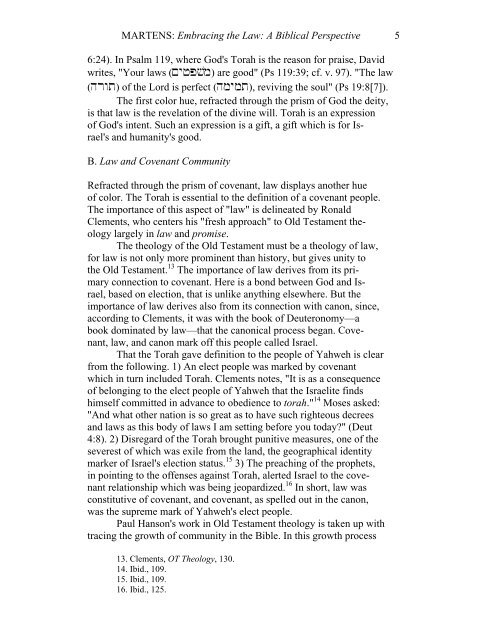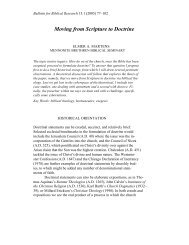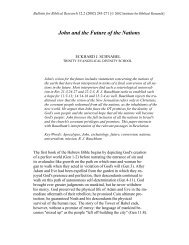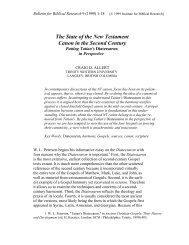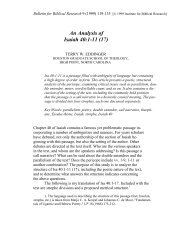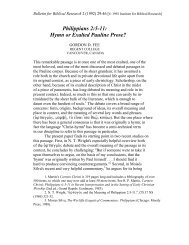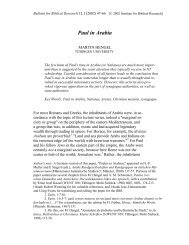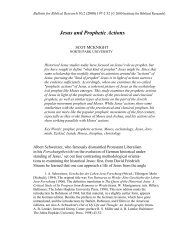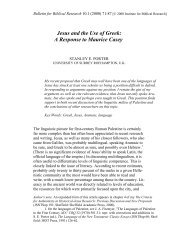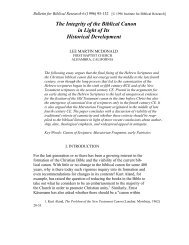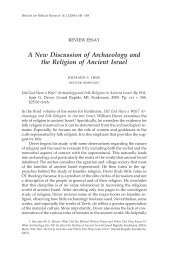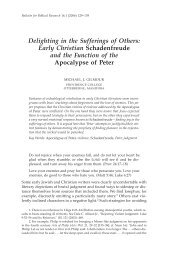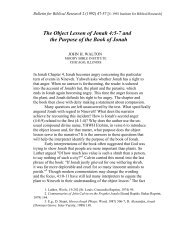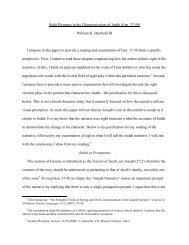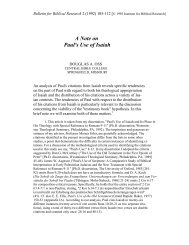Embracing the Law: A Biblical Theological Perspective - Institute for ...
Embracing the Law: A Biblical Theological Perspective - Institute for ...
Embracing the Law: A Biblical Theological Perspective - Institute for ...
You also want an ePaper? Increase the reach of your titles
YUMPU automatically turns print PDFs into web optimized ePapers that Google loves.
MARTENS: <strong>Embracing</strong> <strong>the</strong> <strong>Law</strong>: A <strong>Biblical</strong> <strong>Perspective</strong> 5<br />
6:24). In Psalm 119, where God's Torah is <strong>the</strong> reason <strong>for</strong> praise, David<br />
writes, "Your laws (My+p#$m) are good" (Ps 119:39; cf. v. 97). "The law<br />
(hrwt) of <strong>the</strong> Lord is perfect (hmymt), reviving <strong>the</strong> soul" (Ps 19:8[7]).<br />
The first color hue, refracted through <strong>the</strong> prism of God <strong>the</strong> deity,<br />
is that law is <strong>the</strong> revelation of <strong>the</strong> divine will. Torah is an expression<br />
of God's intent. Such an expression is a gift, a gift which is <strong>for</strong> Israel's<br />
and humanity's good.<br />
B. <strong>Law</strong> and Covenant Community<br />
Refracted through <strong>the</strong> prism of covenant, law displays ano<strong>the</strong>r hue<br />
of color. The Torah is essential to <strong>the</strong> definition of a covenant people.<br />
The importance of this aspect of "law" is delineated by Ronald<br />
Clements, who centers his "fresh approach" to Old Testament <strong>the</strong>ology<br />
largely in law and promise.<br />
The <strong>the</strong>ology of <strong>the</strong> Old Testament must be a <strong>the</strong>ology of law,<br />
<strong>for</strong> law is not only more prominent than history, but gives unity to<br />
<strong>the</strong> Old Testament. 13 The importance of law derives from its primary<br />
connection to covenant. Here is a bond between God and Israel,<br />
based on election, that is unlike anything elsewhere. But <strong>the</strong><br />
importance of law derives also from its connection with canon, since,<br />
according to Clements, it was with <strong>the</strong> book of Deuteronomy—a<br />
book dominated by law—that <strong>the</strong> canonical process began. Covenant,<br />
law, and canon mark off this people called Israel.<br />
That <strong>the</strong> Torah gave definition to <strong>the</strong> people of Yahweh is clear<br />
from <strong>the</strong> following. 1) An elect people was marked by covenant<br />
which in turn included Torah. Clements notes, "It is as a consequence<br />
of belonging to <strong>the</strong> elect people of Yahweh that <strong>the</strong> Israelite finds<br />
himself committed in advance to obedience to torah." 14 Moses asked:<br />
"And what o<strong>the</strong>r nation is so great as to have such righteous decrees<br />
and laws as this body of laws I am setting be<strong>for</strong>e you today?" (Deut<br />
4:8). 2) Disregard of <strong>the</strong> Torah brought punitive measures, one of <strong>the</strong><br />
severest of which was exile from <strong>the</strong> land, <strong>the</strong> geographical identity<br />
marker of Israel's election status. 15 3) The preaching of <strong>the</strong> prophets,<br />
in pointing to <strong>the</strong> offenses against Torah, alerted Israel to <strong>the</strong> covenant<br />
relationship which was being jeopardized. 16 In short, law was<br />
constitutive of covenant, and covenant, as spelled out in <strong>the</strong> canon,<br />
was <strong>the</strong> supreme mark of Yahweh's elect people.<br />
Paul Hanson's work in Old Testament <strong>the</strong>ology is taken up with<br />
tracing <strong>the</strong> growth of community in <strong>the</strong> Bible. In this growth process<br />
13. Clements, OT Theology, 130.<br />
14. Ibid., 109.<br />
15. Ibid., 109.<br />
16. Ibid., 125.


